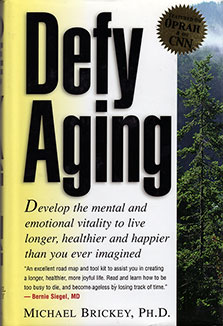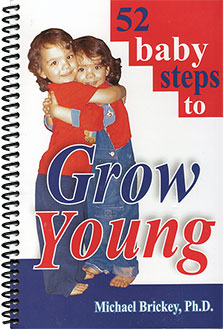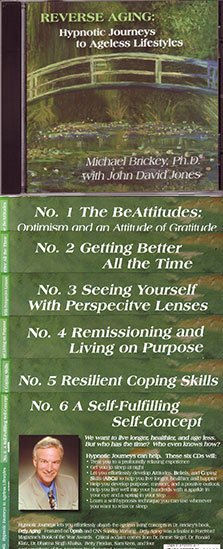The Defy Aging Newsletter
Anti-aging psychology, holistic health, and wellness
These are archives of a biweekly e-mail newsletter for helping you think, feel, look, and be more youthful and live with purpose.
January 17, 2008 Number 180
This issue:
Optimism about the Future
Action to take
Enhance your optimistic outlook by appreciating how technological advances have freed you from the tyranny of the lowest common denominator and made it easier to produce or obtain niche products, services, and information.
Why
Listening to the news, it’s easy to conclude the world is going to hell. A look at the big picture, however, reveals that the world is actually becoming a better, more exciting place. This was especially driven home for me when I read The Long Tail. The tail is about the statistics of consumer choices. For our purposes it is sufficient to say it explains how technological advances have profoundly enabled us to produce and/or obtain niche products, services, and ideas.
Let me share some highlights of this amazing treatise. The story begins in late 1800’s. Farmers drove their horses and wagons to the general store to choose from the limited goods in the store. Then came the Sears and Roebuck catalogue with tens of thousands of items at a fraction of the prices the general store charged. It was a dream come true.
In the 1950s urbanization and the automobile brought department stores and shopping malls and the tremendous choice they offered.
Before 1995 even the mega book stores only offered at most 100,000 titles. Then came Amazon.com that offered a million titles along with reviews and user ratings. Now Amazon offers millions of additional titles through its Associates program. The result is that you can have just about any book in the world delivered to your doorstep. Meanwhile authors can publish and market books much more efficiently and cheaply than ever imagined.
Similar events happened with music. The music industry is losing its ability to dictate the top 40. With sites like I-tunes you are no longer are limited to the selection on the shelves of music stores. Consequently, you if you like to hear the latest Brazilian punk band, you can go online, sample it, and purchase it. Sophisticated preference filters help you find music that fits your preferences, just like Amazon.com flags books are similar to your previous purchases.
Meanwhile, musicians can record, upload, and market their music for a few hundred dollars. Instead of major record companies picking and promoting a few stars, marketing is much more dependent on a democratic groundswell of word of mouth.
Blogging and U-tube lets everyone express their ideas. The marketplace buzz determines who gets a large audience. Meanwhile EBay has become the world’s largest garage sale—and more.
The Encyclopedia Britannica was the gold standard for encyclopedias. Then came Wikipedia. Since its launch in 2001, volunteers have written more than 9 million entries compared to Britannica’s half million entries. It is more comprehensive, more up to date, growing rapidly corrected daily, and free.
Marketing used to require tailoring goods and services to the lowest common denominator—the 3 TV networks, the top 40 hits, the top 100 movies each year, and what could fit on the shelves of a store. Does easier, cheaper production and access result in a lot of junk? Of course. That’s what filters are for (e.g., a Google search). The benefit is that with the explosion of niches, you can get information, services and information, that are tuned to what you want. More choice gives you access to more nuanced thinking. It is democratizing our ability to create, market and consume ideas, products, and services.
Our cumbersome system for selecting the president and Congress has lagged behind this revolution. The same changes that have democratized the marketplace create the opportunity for transparency in government and politics. It may just be a matter of time before politics and government become more transparent and responsive. The public has certainly made it clear that it is fed up with politics as usual and political leaders who clean up the system will be heroes.
In conclusion, being optimistic is a key trait for living a longer, healthier, happier life. The revolutionary changes in our ability to produce, market, and access products, services, and information are making our lives and our world a more wonderful place. Access to information is likely to make the world more democratic as well.
Quotes
As a rule, he or she who has the most information will have the greatest success in life.
~Benjamin Disraeli
Knowledge is power. Information is liberating. Education is the premise of progress, in every society, in every family.
~Kofi Anan
Humor
Granddaughter: It’s impossible for your generation to really understand mine, Grandma Flo. We grew up in different worlds! Today we have TV, space travel, nuclear energy, high-speed computers…Flo: You’re right, Treggie, we didn’t have those things when we were young… So we had to invent most of them.
~Flo & Friends cartoon by Campbell BigelReprint this article from:
THE DEFY AGING NEWSLETTER
Anti-Aging Psychology
Holistic Health and Wellness
This newsletter article may be reprinted in E-zines, newsletters, newspapers, and magazines provided the content is not edited and the attribution below is given. Formatting may be changed and you may use one of the web site pictures of the author to accompany the article.
"Dr. Michael Brickey, The Anti-Aging Psychologist, teaches people to think, feel, look and be more youthful. He is an inspiring keynote speaker and Oprah-featured author. His works include: Defy Aging, 52 baby steps to Grow Young, and Reverse Aging (anti-aging hypnosis CDs). Visit www.NotAging.com for a free report on anti-aging secrets and a free newsletter with practical anti-aging tips."






